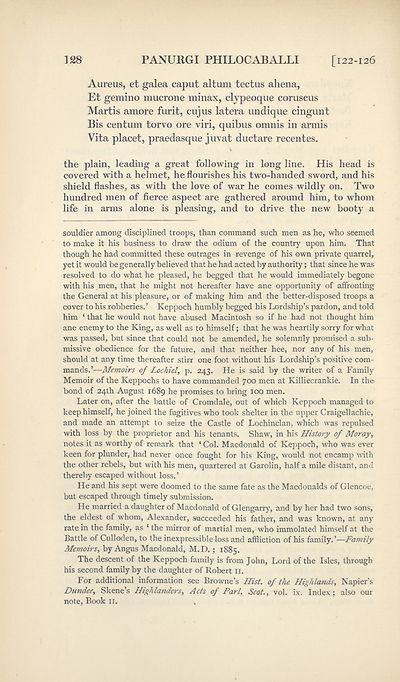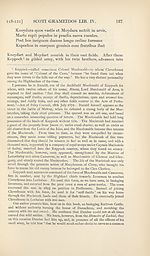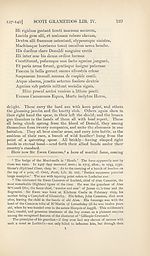Series 1 > Grameid: an heroic poem descriptive of the campaign of Viscount Dundee in 1689, and other pieces
(199) Page 128
Download files
Complete book:
Individual page:
Thumbnail gallery: Grid view | List view

128
PANURGI PHILOCABALLI [122-126
Aureus, et galea caput altum tectus ahena,
Et gemino mucrone minax, clypeoque coruscus
Martis amore furit, cujus latera undique cingunt
Bis centum torvo ore viri, quibus omnis in armis
Vita placet, praedasque juvat ductare recentes.
the plain, leading a great following in long line. His head is
covered with a helmet, he flourishes his two-handed sword, and his
shield flashes, as with the love of war he comes wildly on. Two
hundred men of fierce aspect are gathered around him, to whom
life in arms alone is pleasing, and to drive the new booty a
souldier among disciplined troops, than command such men as he, who seemed
to make it his business to draw the odium of the country upon him. That
though he had committed these outrages in revenge of his own private quarrel,
yet it would be generally believed that he had acted by authority; that since he was
resolved to do what he pleased, he begged that he would immediately begone
with his men, that he might not hereafter have ane opportunity of affronting
the General at his pleasure, or of making him and the better-disposed troops a
cover to his robberies.’ Keppoch humbly begged his Lordship’s pardon, and told
him ‘ that he would not have abused Macintosh so if he had not thought him
ane enemy to the King, as well as to himself; that he was heartily sorry for what
was passed, but since that could not be amended, he solemnly promised a sub¬
missive obedience for the future, and that neither hee, nor any of his men,
should at any time thereafter stirr one foot without his Lordship’s positive com¬
mands.’—Memoirs of Lochiel, p. 243. He is said by the writer of a Family
Memoir of the Keppochs to have commanded 700 men at Killiecrankie. In the
bond of 24th August 1689 he promises to bring 100 men.
Later on, after the battle of Cromdale, out of which Keppoch managed to
keep himself, he joined the fugitives who took shelter in the upper Craigellachie,
and made an attempt to seize the Castle of Lochinclan, which was repulsed
with loss by the proprietor and his tenants. Shaw, in his History of Moray,
notes it as worthy of remark that ‘Col. Macdonald of Keppoch, who was ever
keen for plunder, had never once fought for his King, would not encamp with
the other rebels, but with his men, quartered at Garolin, half a mile distant, and
thereby escaped without loss.’
He and his sept were doomed to the same fate as the Macdonalds of Glencoe,
but escaped through timely submission.
He married a daughter of Macdonald of Glengarry, and by her had two sons,
the eldest of whom, Alexander, succeeded his father, and was known, at any
rate in the family, as ‘ the mirror of martial men, who immolated himself at the
Battle of Culloden, to the inexpressible loss and affliction of his family. ’—Family
Memoirs, by Angus Macdonald, M.D.; 1885.
The descent of the Keppoch family is from John, Lord of the Isles, through
his second family by the daughter of Robert 11.
For additional information see Browne’s Hist, of the Highlands, Napier’s
Dundee, Skene’s Highlanders, Acts of Pari. Scot., vol. ix. Index; also our
note, Book 11.
PANURGI PHILOCABALLI [122-126
Aureus, et galea caput altum tectus ahena,
Et gemino mucrone minax, clypeoque coruscus
Martis amore furit, cujus latera undique cingunt
Bis centum torvo ore viri, quibus omnis in armis
Vita placet, praedasque juvat ductare recentes.
the plain, leading a great following in long line. His head is
covered with a helmet, he flourishes his two-handed sword, and his
shield flashes, as with the love of war he comes wildly on. Two
hundred men of fierce aspect are gathered around him, to whom
life in arms alone is pleasing, and to drive the new booty a
souldier among disciplined troops, than command such men as he, who seemed
to make it his business to draw the odium of the country upon him. That
though he had committed these outrages in revenge of his own private quarrel,
yet it would be generally believed that he had acted by authority; that since he was
resolved to do what he pleased, he begged that he would immediately begone
with his men, that he might not hereafter have ane opportunity of affronting
the General at his pleasure, or of making him and the better-disposed troops a
cover to his robberies.’ Keppoch humbly begged his Lordship’s pardon, and told
him ‘ that he would not have abused Macintosh so if he had not thought him
ane enemy to the King, as well as to himself; that he was heartily sorry for what
was passed, but since that could not be amended, he solemnly promised a sub¬
missive obedience for the future, and that neither hee, nor any of his men,
should at any time thereafter stirr one foot without his Lordship’s positive com¬
mands.’—Memoirs of Lochiel, p. 243. He is said by the writer of a Family
Memoir of the Keppochs to have commanded 700 men at Killiecrankie. In the
bond of 24th August 1689 he promises to bring 100 men.
Later on, after the battle of Cromdale, out of which Keppoch managed to
keep himself, he joined the fugitives who took shelter in the upper Craigellachie,
and made an attempt to seize the Castle of Lochinclan, which was repulsed
with loss by the proprietor and his tenants. Shaw, in his History of Moray,
notes it as worthy of remark that ‘Col. Macdonald of Keppoch, who was ever
keen for plunder, had never once fought for his King, would not encamp with
the other rebels, but with his men, quartered at Garolin, half a mile distant, and
thereby escaped without loss.’
He and his sept were doomed to the same fate as the Macdonalds of Glencoe,
but escaped through timely submission.
He married a daughter of Macdonald of Glengarry, and by her had two sons,
the eldest of whom, Alexander, succeeded his father, and was known, at any
rate in the family, as ‘ the mirror of martial men, who immolated himself at the
Battle of Culloden, to the inexpressible loss and affliction of his family. ’—Family
Memoirs, by Angus Macdonald, M.D.; 1885.
The descent of the Keppoch family is from John, Lord of the Isles, through
his second family by the daughter of Robert 11.
For additional information see Browne’s Hist, of the Highlands, Napier’s
Dundee, Skene’s Highlanders, Acts of Pari. Scot., vol. ix. Index; also our
note, Book 11.
Set display mode to:
![]() Universal Viewer |
Universal Viewer | ![]() Mirador |
Large image | Transcription
Mirador |
Large image | Transcription
Images and transcriptions on this page, including medium image downloads, may be used under the Creative Commons Attribution 4.0 International Licence unless otherwise stated. ![]()
| Scottish History Society volumes > Series 1 > Grameid: an heroic poem descriptive of the campaign of Viscount Dundee in 1689, and other pieces > (199) Page 128 |
|---|
| Permanent URL | https://digital.nls.uk/126597945 |
|---|
| Attribution and copyright: |
|
|---|
| Description | Over 180 volumes, published by the Scottish History Society, containing original sources on Scotland's history and people. With a wide range of subjects, the books collectively cover all periods from the 12th to 20th centuries, and reflect changing trends in Scottish history. Sources are accompanied by scholarly interpretation, references and bibliographies. Volumes are usually published annually, and more digitised volumes will be added as they become available. |
|---|


